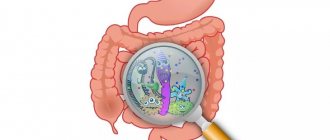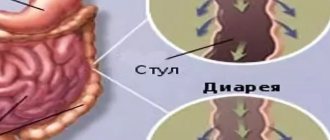The appearance of loose stools
The development of diarrhea in adults is a fairly common symptom.
Diarrhea can be acute (in case of poisoning and acute intestinal infections) and chronic (in case of diseases of the gastrointestinal tract). Diarrhea can produce large amounts of fluid, which causes dehydration. Diarrhea is most often caused by infection. The causative agent can be bacteria (Shigella, Salmonella), viral particles (enteroviruses), parasites (helminths or protozoa). Diarrhea can be dyspeptic, nutritional, neurogenic, medicinal and toxic. In the first case, frequent loose stools are observed due to a lack of enzymes. The cause of nutritional diarrhea is poor nutrition, alcoholism and food allergies. The cause of diarrhea may lie in nervous tension (stress).
In this situation, the nervous regulation of the intestines is disrupted. Very often, diarrhea is a consequence of intestinal dysbiosis, which develops while taking medications. Toxic diarrhea is the most severe. It develops from poisoning with food, chemicals, poisons of mushrooms and plants. The following are the causes of loose stools in adults:
- acute intestinal infections (dysentery, cholera, salmonellosis);
- foodborne illness and intoxication;
- chronic pancreatitis;
- intestinal dysbiosis;
- nonspecific ulcerative colitis;
- Crohn's disease;
- pancreatic enzyme deficiency;
- parasitic diseases (giardiasis, taeniasis, enterobiasis).
When a person consults a doctor, the nature of the bowel movements should be determined. There is diarrhea, which is combined with other symptoms (nausea, fever, abdominal pain, flatulence). Loose stools may be green, yellow, black, or whitish. Sometimes there is diarrhea with water. Detection of blood, mucus or pus in stool may indicate colon pathology, including cancer.
Causes of diarrhea in adults
When your daily visit to the toilet “by and large” begins to regularly exceed twice a day, and the nature of the discharge becomes liquid and of a strange color, then you should immediately contact medical specialists. This is a mandatory condition, since the causes of such disorders can be very serious illnesses.
For what reasons does diarrhea and vomiting occur in an adult? How to treat them?
So, they usually distinguish:
- Dyspeptic diarrhea. It occurs against the background of a lack of digestive enzymes or pancreatic enzymes. In this case, as a rule, the original source of the problem is treated, restoring the normal functioning of the corresponding glands. For diarrhea, special medications are taken to relieve symptoms.
- Drug-induced diarrhea. Such diarrhea often occurs after antibiotics in an adult. What to do in this case and whether it is worth continuing to take medications can only be advised by the attending physician. Not only antibiotics have this side effect, so before taking any medications, you must carefully read the instructions for them.
- Alimentary diarrhea. It is caused by an incorrect and unbalanced diet, chronic alcoholism, or is one of the manifestations of an allergic reaction to any food product. Here, of course, first of all, those suffering from this problem need to carefully review their daily diet.
- Diarrhea due to nervousness (neurogenic diarrhea) is also a fairly common occurrence in our constantly rushing and stressed society. If you experience constant stress, then regular diarrhea may be one of the consequences of your nervous overstrain.
- Toxic diarrhea occurs against the background of acute food poisoning, as well as intoxication of the body due to chemicals, mushroom or plant poisons. Sometimes poisoning occurs without vomiting and diarrhea, but such phenomena are extremely rare; usually the body begins to reject toxic substances that have entered it.
- Diarrhea as a symptom of chronic and other diseases. The cause of frequent urge to go to the toilet can be Crohn's disease, dysbacteriosis, parasites, ulcerative colitis, pancreatitis and other diseases. Diarrhea is only a symptom; the disease itself must be treated.
As a rule, diseases are accompanied by several symptoms at once. For example, you may suffer from nausea, vomiting, diarrhea, weakness without fever or, conversely, with its increase. Whatever it is, you need to see a doctor very urgently, since such symptoms can be the result of very serious diseases.
Diseases with symptoms of diarrhea
Let's look at what diseases are accompanied by symptoms such as constant diarrhea. There is a fairly large list of them, and all of them are treated over a long period.
- Intestinal dysbiosis . In this case, under the influence of external factors (taking medications, lack of fiber in the diet, immune deficiency), the intestinal microflora is disrupted, which is accompanied by a large formation of bile. Diarrhea appears already at the 3rd or 4th degree of dysbacteriosis. Of course, you can take a remedy for diarrhea at home, but a trip to the doctor is simply mandatory so that large-scale treatment of the disease itself can be prescribed. In addition, dysbiosis can occur when taking certain medications, for example, diarrhea is not uncommon when taking antibiotics.
- Ulcerative colitis (also called nonspecific). Diarrhea is also one of the symptoms of this disease, which is classified as a disease of the large intestine. In addition to diarrhea, the patient may also suffer from symptoms such as pain in the lower abdomen, bloating, and fever. In particularly advanced cases, vision problems may occur. In this case, diarrhea cannot be treated quickly at home; hospitalization may even be necessary.
- Enterobiasis , which is caused by a parasite living in the human intestines - the roundworm pinworm. In this case, a sick person may experience nausea, diarrhea, weakness, abdominal pain, rumbling and bloating.
- Pancreatitis . This is a fairly common disease of the pancreas, when there is a lack of enzymes that it secretes for better digestion. The causes of pancreatitis can be very different, ranging from everyday drunkenness and elementary overeating to stomach ulcers. As a rule, this disease, in addition to diarrhea, is accompanied by symptoms such as pain in the lower back or left side. To accurately diagnose the disease, it is necessary to submit a stool test to the laboratory.
- Crohn's disease . It is always very difficult, and the reasons for its occurrence are still not known for certain to modern medicine. At the same time, a person runs to the toilet 4-10 times a day, and blood can be seen in the stool with the naked eye. In addition, this disease is accompanied by weakness, severe abdominal pain, and eye damage may occur. Therefore, if there is causeless severe diarrhea in an adult, then the question is “what to do?” shouldn't stand. You should immediately visit a doctor to rule out the worst causes and begin treatment on time.
- Dysentery and other acute intestinal infections are also accompanied by diarrhea. Usually, the virus that causes this disease can be picked up by drinking unboiled or unfiltered water or eating low-quality foods.
- Intestinal ulcer . With it, the patient's diarrhea is usually black.
https://youtu.be/_pGfhySbJJs
Classification of diarrhea by mechanism of occurrence
. Sodium and chlorine ions accumulate in the intestinal lumen, which leads to an increase in osmotic pressure. High osmotic pressure causes additional water intake and a sharp increase in the volume of intestinal contents. Typically, this type of diarrhea is characterized by very large and loose stools, as well as loss of water and electrolytes.
This type of diarrhea is observed with cholera, salmonellosis, viral intestinal infections, and hormonally active tumors. In addition, some laxatives and prostaglandins cause increased stool frequency in this way.
. To some extent it is similar to the secretory one, since in this case the increased osmotic pressure also leads to excessive accumulation of water in the intestinal lumen and an increase in the volume of feces. However, here hyperosmolarity does not arise due to increased secretion of sodium and potassium ions, but due to the fact that the intestinal contents initially have high osmotic pressure. This type of diarrhea usually occurs in the case of rotavirus infection, as well as with an overdose of saline laxatives.
. Inflammation develops in the lower intestines, which impairs the reabsorption of water. Observed in dysentery and amoebiasis.
. Dilution of feces occurs due to additional release of blood, protein exudate, mucus or pus into the intestinal lumen. This type of diarrhea is typical for diseases accompanied by inflammation of the intestinal mucosa - Crohn's disease, intestinal tuberculosis, ulcerative colitis, etc.
. Characterized by acceleration of intestinal motility. Typically observed in cases of stress, functional digestive disorders, diabetic enteropathy, amyloidosis, scleroderma.
Types of diarrhea
Taking into account the method of occurrence, several types of acute diarrhea are distinguished. They differ in clinical picture, as well as etiological development factors.
Secretory diarrhea
The main symptom of secretory type diarrhea is the loss of large amounts of electrolytes during diarrhea. The pathological process develops due to the impact of infectious agents on the intestines and its mucosa. Secretory acute diarrhea in adults is characterized by a large amount of feces, more than 1000 ml per day. The appearance of such diarrhea does not depend on diet.
Osmolar diarrhea
Osmolar-type diarrhea occurs due to impaired absorption of water and nutrients by the intestinal mucosa. Fecal masses contain food particles that have not been digested by the intestines.
Osmolar diarrhea occurs when using pharmacological drugs in violation of the recommendations specified in the instructions. Another reason for the appearance of the disease is the absence or insufficient amount of enzymes for digesting food (problems with the pancreas). Treatment of acute osmolar-type diarrhea involves long-term adherence to a strict diet.
Exudative diarrhea
With exudative diarrhea, stool contains blood or mucus. The occurrence of such diarrhea is facilitated by a viral infection. There is often inflammation in the mucous membrane of the large intestine, which can worsen diarrhea.
Hyperkinetic diarrhea
The main cause of hyperkinetic diarrhea is stress or a disorder of the nervous system. Stress factors provoke an acceleration of intestinal motility, which naturally causes diarrhea. Systematic stress is the cause of irritable bowel syndrome, since long-term impaired motility causes deterioration in the blood circulation of the organ.
Hypokinetic diarrhea
Diarrhea of the hypokinetic type is provoked by a disruption of the intestinal microflora when pathogenic bacteria multiply there. This disease is characterized by the presence of undigested particles of protein and fat in the stool. Feces have a characteristic unpleasant odor, which appears due to the activation of intestinal fermentation processes.
Intestinal dysbiosis
A common cause of diarrhea in adults is dysbacteriosis. Feces in the intestines are formed as chyme moves through. At the same time, nutrients are digested, as well as various electrolytes and water are absorbed. The digestion process occurs with the participation of microflora. The normal composition of bacteria in the intestinal cavity is represented by bifidobacteria, bacteroides, lactobacilli, E. coli, peptococci and other microbes.
The causes of dysbiosis include oral administration of antibacterial drugs, radiation, lack of fresh fruits and vegetables in the diet, the presence of chronic intestinal pathology, and immunodeficiency. Loose stools are most often observed with dysbacteriosis of degrees 3 and 4. The development of diarrhea is based on the following processes:
- impaired water absorption;
- increased intestinal motility;
- formation of a large volume of bile acids.
Often such patients are worried about nausea, allergies in the form of a rash, bloating, pain, loss of appetite, and belching. Long-term dysbacteriosis causes the development of chronic enterocolitis and weight loss for the patient.
Causes
Bowel problems that continue for a long time are chronic. There are certain reasons for frequent diarrhea:
- infectious diseases;
- long-term use of laxative medications;
- diseases of the colon, stomach, intestines, liver, pancreas, gall bladder;
- dysbacteriosis;
- destruction of the natural intestinal microflora;
- inflammatory diseases of the colon;
- ulcerative colitis;
- food, chemical poisoning;
- low enzyme levels;
- excess hormones produced;
- the occurrence of tumors, cysts of a malignant or benign nature;
- pancreatitis;
- Crohn's disease;
- malabsorption syndrome;
- non-compliance with diet;
- excessive consumption of alcoholic beverages;
- stressful tension.
In an adult, loose stools can occur constantly due to pathogens, bacteria, and infections entering the body. As a result, a person becomes ill with intestinal flu, salmonellosis or rotavirus. Loose stools are the main symptomatic sign of these pathologies. But diarrhea due to viral and infectious diseases does not have a chronic form.
A long course of using laxatives leads to disruption of intestinal motility, which causes a decrease in the sensitivity of the mucous membrane of the organ, and then a chronic form of diarrhea occurs. The appearance of dysbiosis and destruction of intestinal microflora is associated with long-term use of potent drugs as the main medications for the treatment of diseases, a small amount of incoming nutrients, vitamins, weakened immunity, and radiation exposure.
Pathologies of vital organs and body systems affect the absorption of incoming vitamins, substances, and amino acids by the small intestine during the digestion of food. Poor absorption of nutrients occurs as a result of low levels of proteins, which contribute to the thorough breakdown of vitamins and amino acids, as well as due to diseases of the gastrointestinal tract: pancreatitis, gastritis, ulcerative colitis. Malabsorption syndrome causes disruptions in metabolic processes.
Chronic diarrhea in adults occurs due to poor lifestyle choices. Eating processed foods, fast food, fatty, spicy foods negatively affects the functioning of the digestive system. Toxins contained in strong alcoholic drinks contribute to the destruction of the mucous membrane of the stomach and intestines. Stress and psychosocial factors negatively affect the regularity of bowel movements.
Main symptoms
The leading causes of diarrhea in adults are:
- food poisoning;
- excessive consumption of “heavy” foods;
- diseases of the digestive system, accompanied by inflammation of the intestinal walls (enteritis, enterocolitis);
- food allergies;
- enzyme deficiency;
- taking certain medications (for example, synthetic sweeteners, laxatives);
- sudden change in food style and conditions (travelers' diarrhea);
- intestinal flu and other infections;
- lead and mercury poisoning;
- stress.
When diarrhea is accompanied by a fever up to 380C, vomiting, or diarrhea with blood or water diarrhea, it is important to immediately consult a doctor in order to receive adequate treatment and avoid the development of serious complications.
The most obvious symptom of diarrhea is loose stools, but this is only one of many signs of an intestinal or stomach disorder. Depending on the accompanying symptoms, the doctor can more accurately determine the disease and select the appropriate treatment. Symptoms of diarrhea:
- lower abdominal pain;
- frequent urination;
- vomit;
- increased gas formation;
- feeling of heaviness;
- high body temperature.
In case of poisoning, diarrhea is most often accompanied by severe vomiting, but these symptoms disappear relatively quickly after taking appropriate medications. If the cause of diarrhea is an infection, then the symptoms only intensify over time. A sign of infectious diseases is a change in the color of stool to gray, and the consistency becomes clayey rather than liquid.
When you have diarrhea, you should pay attention to the color of the mass and the presence of impurities. If a yellow or whitish tint appears, pancreatitis is most likely the cause of diarrhea. Disturbances in the functioning of the pancreas lead to a deficiency of enzymes that help digest food.
It happens less often that a woman experiences either constipation or diarrhea. This is a sign of the presence of parasites in the intestines. Infection is accompanied by weakness, lethargy, and headaches. In addition to diarrhea, there may be nausea and, less commonly, vomiting. When infected with salmonella, the body temperature rises, mucus appears in the stool, and less often blood. If diarrhea lasts for a long time, dehydration occurs. Its main symptoms:
- weakness;
- dizziness;
- dry mouth;
- low pressure;
- rapid pulse;
- blackness before the eyes;
- thirst.
In the most severe stage of dehydration, cachexia occurs, extreme exhaustion of the body with weight loss and loss of ability to work.
What is diarrhea
Diarrhea is loose stool that comes out of the intestines at least twice a day. Impaired functioning of the intestines, as a result of which the walls do not absorb liquid, causes stool liquefaction. Diarrhea also occurs due to the release of inflammatory secretions or when intestinal motility is disrupted.
Diarrhea is a fairly common phenomenon and rarely does anyone pay attention to stool disorder. And completely in vain. Prolonged diarrhea in an adult is dangerous due to dehydration and removal of useful substances from the body.
Important! If diarrhea lasts several days or longer, you should consult a doctor to avoid complications.
Symptom of pancreatitis
For diarrhea, causes include pancreatic disease. This organ takes an active part in the digestive process. Diarrhea is a common symptom of chronic pancreatitis. With this disease, organ function decreases and insufficient enzyme production is observed. The causes of pancreatitis include chronic alcoholism, domestic drunkenness, cholelithiasis, inflammation of the small intestine, peptic ulcer, acute inflammatory process, exposure to toxic substances, unhealthy diet (overeating, consuming large amounts of fat).
Frequent and loose stools against the background of pancreatitis are observed due to the entry of poorly digested food into the large intestine. A large amount of nutrients leads to the activation of bacteria. This intensifies fermentation and putrefactive processes, which ultimately leads to stool disturbances such as diarrhea, frequent urge to go to the toilet and bloating.
The stool is often mushy. It contains many pieces of undigested food. With inflammation of the pancreas, diarrhea is not the only symptom. It is combined with pain in the left side or lower back and dyspeptic syndrome. Stool analysis for suspected chronic pancreatitis plays an important role in making a diagnosis.
What to do if you develop frequent symptoms of diarrhea
Due to the wide variety of reasons that can cause the development of frequent diarrhea in adults and children, before starting treatment, it is necessary to find out why this happens. To do this, you need to discuss your problems with a therapist or gastroenterologist, who will prescribe a diagnostic examination aimed at identifying the true causative factor. Since most adults suffering from repeated diarrhea do not have organic diseases of the intestines and pancreas, the primary task of diagnosis is to divide patients into 2 main groups: with functional and organic causes of diarrhea.
During the examination, after a physical examination, clarification of the diet and assessment of nutritional status, the nature of the abdominal pain must be specified and it is determined how long episodic cases of diarrhea have been observed, what is the frequency of bowel movements, how thin the stool is, whether there are edema and weight loss bodies. When conducting laboratory tests, specialists pay attention to a decrease in the number of red blood cells, hemoglobin and serum iron, changes in the level of total protein, cholesterol, urea, glucose, and calcium.
To clarify the causes of frequent episodes of diarrhea, ultrasound of the abdominal organs is used. This imaging method includes examination of the intestines, pancreas, bile ducts, colon, small intestine and regional lymph nodes. With normal laboratory values and the absence of the so-called. “alarm symptoms” are diagnosed as functional diarrhea. In other cases, the likelihood of developing frequent diarrhea of organic origin is considered.
Additional research methods include esogastroduodenoscopy and multiple biopsy (taking material for histological analysis from different parts of the intestine).
Why is frequent diarrhea dangerous?
If stools are watery and frequent, you are more likely to develop dehydration and electrolyte loss, which can be fatal. For this reason, you should immediately see a doctor and immediately provide assistance to the sick person if the following symptoms are observed:
- dry mucous membranes;
- increased heart rate;
- chapped lips;
- rare or complete absence of urination;
- decreased blood pressure;
- the appearance of muscle cramps;
- disturbance of consciousness.
Be sure to consult a doctor in the following situations:
- diarrhea does not stop for 3 or more days;
- bowel dysfunction occurs and develops without reason;
- in addition to diarrhea, yellowness of the sclera and skin, intense abdominal pain, sleep disturbance and high fever are observed;
- stools are dark black or green in color, mixed with blood.
Treatment tactics
First of all, if you have prolonged diarrhea, you should consult a doctor. Only a specialist will be able to accurately determine the cause and select a therapeutic regimen. Often, to treat chronic diarrhea in adults, it is enough to change the diet and take a course of probiotics and antidiarrheal drugs. If the cause of the pathology is an infection, the patient is prescribed antibiotics.
With the development of chronic diarrhea due to colitis or Crohn's disease, symptomatic therapy is primarily carried out. With this treatment, the severity of symptoms can be reduced and the patient’s general condition can be alleviated.
Drug therapy
Drug treatment is based on the use of various groups of drugs. Attention, only the attending physician should select medications. For chronic diarrhea, the following groups of drugs are used:
- Medicines that reduce the amount of mucus production in the intestines. They are usually prescribed at the first stage of the disease. In Crohn's disease, anti-inflammatory drugs such as Sulfasalazine and Diclofenac are especially effective.
- Antidiarrheal medications Loperamide, Imodium and Octreotide can reduce intestinal motility and stop diarrhea. But remember, such medications cannot be used if diarrhea has developed due to an infection.
- Antibacterial, antimicrobial and antiseptic drugs. They are used to destroy microorganisms that provoke pathology. For example, Entoban, Meksaform, Dependal-M.
- For diseases of the gastrointestinal tract, doctors prescribe fermented drugs (Mezim Forte, Creon, Festal).
Typically, treatment for chronic diarrhea lasts about 30 days. To support the intestines during this time, Hilak-Forte drops containing lactobacilli can be prescribed.
It is the neglected and improperly treated disease that leads to the development of a chronic form. Prolonged diarrhea can lead to such serious pathologies as intestinal obstruction, cachexia and hyperthermia.
Constant, persistent diarrhea can also occur in adults. This is a disorder of the digestive system, it does not occur without a reason. It is important to understand that this is often a symptom. What is required is not only the treatment of the inconvenient consequences, but in addition the underlying cause disease. A medical specialist will help determine the disease. An accurate diagnosis will require a series of tests and studies. Subsequently, the prescribed therapy will bring results.
Loose and frequent stools are not always a reason to panic, but timely treatment is the path to a speedy recovery. What should I do if I or my husband have constant diarrhea? The issue of getting rid of an ailment is similar to peeling an onion: you need to peel off many layers before the core appears. The main reasons to help get rid of the “husk” and find sources:
- Allergies and intolerances to food products.
- Adverse reaction to medications.
- Vitamin and dietary supplements taken.
- Chronic stress.
- Infection.
- Reduced absorption syndrome.
- Irritable bowel syndrome.
- Bowel cancer.
- Consuming large amounts of carbohydrates, including sugar.
Nonspecific ulcerative colitis
The causes of diarrhea are often associated with diseases of the large intestine.
With this disease, inflammation of the mucous membrane and the formation of ulcers are observed. Mostly young people aged 20 to 40 years are affected. There are several theories for the development of this pathology (autoimmune, genetic, infectious). Ulcerative colitis is characterized by the following symptoms:
- bowel dysfunction;
- the presence of blood and mucus in the stool;
- pain in the lower abdomen;
- bloating.
During exacerbation, body temperature rises. Patients lose weight. They experience weakness and muscle pain. The function of the organ of vision is often impaired. Diarrhea is one of the most persistent symptoms. 95% of patients complain about it.
The frequency of bowel movements is on average 3-4 times a day. With exacerbation, the urge to go to the toilet becomes more frequent. Blood and large amounts of mucus are found in the stool. Diarrhea in ulcerative colitis is sometimes combined with constipation.
Diarrhea, or Diarrhea
Diarrhea is a pathological condition in which frequent bowel movements occur. A single bowel movement with liquid feces is also classified by doctors as diarrhea. The medical term “diarrhea” (diarchoia), used by doctors to describe such an unpleasant condition, comes from the Greek diarrhoea - “expiring.” This is understandable, since with diarrhea, stool becomes liquid, the water content in feces increases to 95% (the norm is from 60 to 80%), and bowel movements occur more than three times a day. Diarrhea is not an independent disease; it is a symptom of various painful conditions and diseases.
First aid for diarrhea
If you experience diarrhea and vomiting or diarrhea and fever, it is better to consult a doctor as soon as possible, since these symptoms may indicate the development of a serious illness, for example, acute intestinal poisoning. First aid until the patient is examined by a doctor is to prevent dehydration and significant loss of minerals. In this regard, experts, in case of diarrhea, recommend the following:
- Drink plenty of minerals. For this purpose, Regidron (and its analogues) is best suited. If it is absent, then you can take lightly salted water or saline solution.
- Stick to a strict diet. When diarrhea begins, it is better to generally abstain from 1 – 2 or more meals, unless the doctor recommends otherwise. To relieve intestinal inflammation, you can drink tea or decoctions of anti-inflammatory herbs.
The most common drugs used to treat diarrhea are:
- Sorbents (activated carbon, Enterosgel, Polyphepan). Designed to remove toxins from the body and intestines, adsorb gases, reducing flatulence. They are taken on an empty stomach, and also separately from other drugs.
- Anti-inflammatory and hormonal drugs (Sulfasalosin, Indrometacin, Prednisolone, Metypred). Recommended in cases where the inflammatory process in the intestines is severe, especially with chronic diarrhea.
- Enzymes (Creon, Pancreatin, Mezim). Used in situations where stool disorders are associated with enzyme deficiency (for example, excessive overeating, chronic pancreatitis with exocrine insufficiency, etc.). They allow you to normalize the digestion process and, thus, improve the formation of feces.
- Reducing intestinal motility (Loperamide, Imodium). This group of drugs is indicated for the development of motor-type diarrhea, when due to increased peristalsis, the evacuation of feces from the intestines is accelerated. Recommended for irritable bowel syndrome, stressful digestive disorders, as well as in some cases of Crohn's disease.
- Antispasmodics (No-shpa, Papaverine). Eliminate spasms, reduce intestinal motility, and reduce pain.
- Antibiotics, antiparasitic and intestinal antiseptics (Furazolidone, Intetrix, Enterofuril and others). They are used when there is an intestinal, parasitic infection or helminthic infestation.
- Probiotics and intestinal immunomodulators (Linex, Laktovit, Laktiale, Galavit). Normalize intestinal microflora and increase local immunity.
Treatment
When choosing treatment methods, remember: it is not the symptoms that need to be treated, but the source of the disease.
Since diarrhea is a dangerous ailment that can significantly worsen health, the choice of medications is made according to the principle of “do no harm.” Strict adherence to the doctor’s recommendations and the instructions for use of the drug will help you quickly get rid of diarrhea and the accompanying symptoms.
Not all diarrhea can be cured at home; there are signs of serious pathologies that cannot be avoided without medical help:
- Increased body temperature. The fever does not subside within 2-3 days.
- A symptom of dehydration. The patient is dizzy, thirsty, general weakness, vomiting.
- Spasmodic and burning pain in the abdomen.
- The stool contains blood or the stool turns black.
The absence of indications for an emergency call to an ambulance allows you to begin treatment with medications sold in pharmacies.
Sorbents
The action of drugs included in the group of sorbents is aimed at binding toxins and other toxic substances found in the stomach and intestines. Then it is safely removed from the body naturally along with feces. Smecta, Polysorb, activated carbon, Atoxil - help get rid of pathogenic microorganisms, have an astringent effect, and help stop acute diarrhea. The effect of use is noticeable if you take these drugs after the first signs of the disorder appear.
Rehydration products
During the period of diarrhea and profuse vomiting, fluid leaves the human body in large volumes and the water-salt balance is disturbed. Regidron is used to replenish lost moisture and salts. The drug solution replenishes lost fluid and restores electrolyte balance.
Crohn's disease
One of the most severe inflammatory diseases of the digestive tract is Crohn's disease. It affects all layers (mucosal, muscular and submucosal). Areas of inflamed tissue alternate with healthy ones. The process can affect the upper and lower parts of the digestive tube. The small intestine is most often affected. There are 3 degrees of severity of the disease.
With a mild course of the disease, the frequency of stools is up to 4 times a day. Blood is rarely present in stool. With moderate severity, diarrhea bothers patients up to 6 times a day. The presence of blood in stool is noticeable to the naked eye. Diarrhea with a frequency of up to 10 times indicates a severe course of the disease. In the latter case, complications develop (fistulas, abscesses, bleeding).
Crohn's disease develops in people for unknown reasons. Young people under 35 years of age are most often affected. Additional symptoms of this pathology are cutting or aching pain in the abdomen, myalgia, weakness, malaise, and eye damage. The diagnosis of Crohn's disease can only be made after a thorough examination of the sick person.
Symptoms of acute diarrhea
Additional signs of diarrhea depend on the factor of occurrence or the individual characteristics of the body. In most cases, when acute diarrhea occurs in adults, the following symptoms occur:
- diarrhea at the most inopportune moment;
- frequent bowel movements;
- general malaise;
- state of lethargy and drowsiness;
- burning and itching in the anal area;
- pallor;
- decrease in urine volume;
- unpleasant odor;
- no appetite.
For any reason for indigestion, such symptoms may intensify. It depends on the degree and severity of the pathology. When weakness and general malaise begin to appear, the patient needs to replenish the water balance. If primary symptoms of dehydration occur, immediately seek medical help.
However, if the main symptoms occur, you need to pay attention to dizziness or fever. The pain syndrome can be located in the navel or hypochondrium. Treatment of additional symptoms separately is prohibited. It is especially forbidden to make independent decisions regarding the treatment of the disease. This will lead to complications. Otherwise, death will occur.
Treatment of diarrhea: diet
Complete treatment for diarrhea includes the following dietary recommendations.
- It is allowed to eat such foods as white crackers, slimy porridges, vegetable purees, steamed and boiled fish, lean meats, rice water, and tea.
- It is prohibited to eat spicy, salty, sour foods, or foods containing large amounts of coarse fiber. In addition, milk, brown bread and anything that can cause increased gas formation and “fermentation” are not recommended.
- In the first days, foods that stimulate the release of bile are excluded from the diet: eggs, fatty meat, butter, etc.
Gradually, the list of permitted products is expanding, and the patient, as stool normalizes, can switch to a normal diet. In situations where diarrhea is caused by enzyme deficiency or any chronic intestinal diseases, systematic diet is one of the most effective means of therapy.
Causes of prolonged diarrhea
Diarrhea is frequent loose stools that can be caused by a variety of reasons.
Diarrhea accompanies various diseases. Pathological conditions that provoke prolonged diarrhea include diseases of the digestive tract:
- Enteritis
- Dysbacteriosis
- Enterocolitis
- Pancreatitis
- Colitis
- Lactose intolerance
- Pancreatic fibrosis
- Irritable bowel syndrome
- Oncological formations
- Enzyme deficiency
Diarrhea can develop as a result of internal bleeding in the digestive system: with open ulcers of the duodenum or stomach, with damage to the small and large intestines.
In frequent cases, the causes of diarrhea can be various infectious and inflammatory diseases, the causative agents of which are considered to be viruses and pathogenic bacteria. Diarrhea may indicate the presence of dysentery, salmonellosis, cholera, and various parasites in the body. Prolonged diarrhea is caused by Norfolk virus and rotaviruses.
Sometimes this condition appears when a person has experienced a stressful situation, namely after anxiety, fear, or psycho-emotional stress.
Other diseases also affect the development of diarrhea: hyperthyroidism, autoimmune diseases. In addition, poor digestion and abuse of alcohol-containing drinks contribute to the occurrence of diarrhea. It is also possible to develop this condition after surgery in the gastrointestinal tract.
What causes diarrhea? The causes of this condition can be varied. It is important to know well the cause of diarrhea, as otherwise treatment may not be effective.
A condition such as diarrhea can be caused by the following reasons:
- poisoning,
- diet errors, overeating,
- chronic or acute intestinal infections
- parasitic diseases,
- lack of digestive enzymes,
- intestinal motility disorder,
- inflammatory processes of the gastrointestinal tract,
- disturbance of the bacterial balance in the intestines,
- tumors of the gastrointestinal tract.
Additional factors contributing to the occurrence of diarrhea are:
- insufficient personal hygiene;
- insufficient chewing of food, incorrect eating habits;
- stress and neuroses;
- sedentary lifestyle;
- use of certain types of medications;
- reduced immunity;
- pregnancy;
- childhood.
However, whatever the causes, diarrhea requires serious treatment and adequate treatment.
Our digestive organs are a very convenient gateway for various pathogenic agents to enter the body. It doesn’t matter what exactly it is – viruses, bacteria, protozoa or multicellular parasites. Many microorganisms can settle in the intestines and cause infectious diseases leading to diarrhea.
The main viral and bacterial infections that can cause diarrhea are:
- salmonellosis,
- dysentery,
- rotavirus infection,
- enterovirus infection.
As a rule, the main symptom indicating that diarrhea is caused by an infection is fever. Also, infections of the gastrointestinal tract are often accompanied by nausea, vomiting, and general weakness. Patients often complain that they have a stomach ache or pain in the lower abdomen.
Digestion is a complex chemical process. It involves many substances, whose task is to break down the organic substance entering the digestive tract into those simple compounds that can be absorbed by the body’s tissues. Many of the substances necessary for digestion are produced by various organs - the liver, stomach, pancreas.
Such compounds include pepsins, bile, pancreatic enzymes - protease, lipase, amylase. If any of the enzymes is missing, this means that undigested food remains will accumulate in the intestines. This causes irritation and upset of the intestines, which causes diarrhea.
Poisoning
Often, loose stools are the body’s reaction to toxic substances. There may well be some toxins in the food we eat. This may mainly apply to stale or expired products, products treated with some chemicals or containing poisons (mushrooms, fruits and vegetables). It is also possible that drugs and chemicals may be ingested in large doses.
This circumstance may well cause poisoning of the body, accompanied by diarrhea. As a rule, in case of poisoning, not only loose stools are observed, but also other symptoms. Typically, poisoning is initially accompanied by pain and stomach cramps. As the pathological process develops, poisoning begins to manifest itself as cramping pain, vomiting, nausea, sometimes headaches, neurological symptoms, or symptoms of cardiovascular failure.
One of the varieties of this type of diarrhea is the so-called “travelers’ diarrhea”. Although in fact this disease has a whole range of causes. It occurs in people who try a large amount of unusual and unfamiliar food. Most often, this behavior is typical for people who travel to distant and exotic countries and want to get new sensations.
However, the problem is that our gastrointestinal tract and the body as a whole are conservative in nature and, to a certain extent, are tuned to the diet to which they have been accustomed since childhood. And when faced with something new, their work becomes disorganized, resulting in loose stools and an upset stomach.
In diseases of this type, undigested food remains due to malfunctions of the autonomic nervous system of the intestine move too quickly through it and do not have time to form solid feces. Most often, this type of diarrhea is characteristic of a disease called “irritable bowel syndrome.”
Dysbacteriosis
Many of the bacteria that live in our intestines are not pathogenic, but take part in the digestive process. If the number of intestinal bacteria drops catastrophically, for example, in the case of taking antibiotics, then a proliferation of other microorganisms may be observed, as well as disruptions in the digestion process, which often leads to diarrhea. After restoring the balance of the microflora, the stool, as a rule, returns to normal.
Other reasons
Loose stools that have been bothering a person for several months or years may be a symptom of parasitic diseases. The most common of them is enterobiasis. This disease develops in children and adults. The latter get sick less often. The causative agent of enterobiasis is the pinworm. This is a round parasitic worm that lives in the small and large intestines.
Enterobiasis is manifested by the following symptoms:
- anal itching;
- cramping pain in the abdomen;
- loose stools;
- nausea;
- tenesmus;
- bloating and rumbling in the stomach.
In such patients, the stool becomes mushy. Diarrhea may alternate with constipation. Loose stools in adults are observed when protozoa (giardia) enter the intestines. Giardiasis can be contracted by eating unwashed vegetables and fruits. Diarrhea is the main symptom of this disease. The stool has a foul odor.
There are no pathological impurities (mucus and blood). This is a valuable diagnostic criterion. Bloody diarrhea in an adult is possible due to acute intestinal infections (dysentery). You can get sick by drinking unboiled water infected with Shigella, as well as poor-quality food products. With dysentery, the frequency of stools can reach 10 times a day. There is blood and mucus in the stool.
The presence of green liquid stool, reminiscent of swamp mud, indicates the development of salmonellosis. This disease is more severe. It occurs less frequently in adults than in children. Liquid stool that is gray in color, with a shiny and oily surface is a sign of enzymatic pancreatic insufficiency. Thus, the appearance of diarrhea in an adult may be a sign of intestinal or pancreatic diseases.
Diagnosis and treatment
Diagnostic procedures are prescribed depending on the patient’s complaints. If he has severe and sharp abdominal pain, an abdominal ultrasound is prescribed. And also in case of prolonged diarrhea, it is recommended to take a smear from the rectum for culture, general and biochemical blood tests. These procedures will help identify diseases of the internal organs. To clarify the diagnosis, a colonoscopy or sigmoidoscopy may be prescribed. These are informative methods for examining the intestines, allowing one to identify tumors, fistulas, diverticula, etc.
If an adult has persistent loose stools due to an infection, you should not hesitate to get examined. An infectious disease has the ability to spread, affect other tissues, and weaken the body. This condition is especially dangerous during pregnancy, since the risk of intrauterine infection is high.
Treatment also depends on the cause. There is no particular need to take medications without a doctor's prescription.
Treatment for diarrhea includes:
- Antibiotics. They are prescribed for bacterial infections. After a course of antibacterial drugs, diarrhea may continue due to dysbiosis, so it is imperative to take probiotics at the same time.
- Painkillers. If the pain is severe, you can take a painkiller or antispasmodic. These drugs will eliminate unpleasant symptoms and reduce intestinal motility. The most accessible of them is No-shpa.
- For neurogenic or hyperkinetic forms of diarrhea, it is necessary to take sedatives and adaptogens. Herbal remedies are the safest and most effective. These include Valerian, Blue cyanosis, Rhodiola rosea, Meadowsweet, Leuzea.
- Enterosorbents. They can be taken for any type of diarrhea. They quickly absorb and remove toxins without causing side effects.
- Pro and prebiotics. If there is constant seething in the stomach and loose stools, but there is no vomiting or fever, drugs that restore the microflora will help. Baktisubtil and Hilak Forte are effective in this regard. The first contains bacteria in such a form that they do not die in the stomach, but reach the large intestine and do their job. Hilak belongs to the group of prebiotics and contains a nutrient medium for the growth of beneficial bacteria.
Do not take restorative medications or painkillers until the doctor arrives. This can blur the clinical picture and worsen the patient's condition. Moreover, these medications only treat symptoms and have side effects.
Only probiotics and enterosorbents are considered safe. Taking other medications must be agreed with a specialist.
How to treat diarrhea with medications
To successfully treat diarrhea, several types of medications are combined. Depending on the cause of diarrhea, different groups of drugs are prescribed:
- antibiotics;
- probiotics;
- analgesics;
- sorbents;
- antiviral drugs;
- choleretic agents;
- enzymes.
In severe cases of dehydration, the administration of saline solution will be required. During the treatment of milder forms of diarrhea, you need to drink more water to avoid dehydration.
Diarrhea accompanied by additional symptoms
It is rare that when diarrhea in adults occurs against the background of gastrointestinal disorders, there are no other accompanying signs. Symptoms that are often added when diarrhea bothers you are:
- nausea, vomiting with the passage of mushy, loose stools alternating with constipation are signs of infection with intestinal invasions, a consequence of intoxication (poisoning) of the body;
- increased gas formation;
- discharge of clayey, gray feces;
- cramps, colic in the abdomen - a sign of an intestinal infection;
- temperature increase of 37.5 g with acute appendicitis;
- headache;
- weakness;
- discharge of greenish-brown stool with mucus, blood, temperature rise above 38 degrees with salmonellosis;
- the appearance of black liquid stool with bleeding is a sign of Crohn's disease, stomach ulcers;
- muscle weakness, decreased vision, constipation accompanied by diarrhea, passing stool more than 5 times a day - with ulcerative colitis or nonspecific ulcerative colitis (UC);
- stool with mucus (blood), passing up to 10 times a day, pain and rumbling in the abdomen, flatulence, red spots on a person, blanching (drying) of the dermis, dryness and a bitter taste in the mouth - signs of Crohn's disease.
Of course, a one-time occurrence of short-term diarrhea without fever and vomiting in an adult is unlikely to cause serious harm to health. But, regardless of the nature of diarrhea, it is worth rehydrating the body, replenishing the lack of fluid, thereby maintaining the water-salt balance.
Diarrhea symptoms
If, unexpectedly, liquefied or half-water thin stool appears and their number exceeds three times during the day and night, or defecation of loose stool with bloody veins, or droplets of blood, with mucus even 2 times in a row, this indicates the onset of diarrhea ( diarrhea).
In the majority of episodes, non-infectious manifestations disappear within 2-3 days or about a week. However, before they disappear, it is very important to have the skill to take timely measures and alleviate the condition of a suffering person.
Types and stages
Doctors divide diarrhea into 2 types:
- acute with a duration of 1-3 days, the cause of which is damage by viruses (bacteria), allergies to medications, food poisoning;
- chronic with fairly prolonged diarrhea, periodically changing to remission, which indicates the development of a hidden disease (ulcerative colitis, Crohn's disease, IBS), a failure in the endocrine system.
The types are distinguished:
- diarrhea with water in an adult in case of infection of the body with viruses, bacteria with the subsequent release of toxic substances, settlement of bacteria in the intestinal walls, development of diseases (dysentery, salmonellosis);
- intoxication;
- enzymatic;
- infectious;
- medicinal;
- with bleeding;
- fatty (a common form of diarrhea, a consequence of malabsorption of food, a malfunction in the digestive system. Provoking factors are diseases of the pancreas (liver) with the inability to produce juice in the required quantity or bacterial infection);
- inflammatory (a consequence of the development of the inflammatory process in the intestinal walls, a number of diseases (Crohn's disease, nonspecific ulcer, malignant tumor, immunodeficiency);
- secretory (triggered by toxic substances, fatty acids, drugs, alcohol, cancer (carcinoma)).
- osmotic (a consequence of an increase in osmolar components in quantity with location in the lumen of the rectum. The peculiarity of this form is the passage of liquid feces even in the absence of meals, i.e. on an empty stomach. Provoking factors are IBS, the formation of a fistula in the intestine, lactase deficiency, intake some medications (cholestyramine, lactulose, magnesium sulfate, neomycin)).
Nutrition for chronic diarrhea
If we talk about why chronic diarrhea often occurs in adults, then in the absence of infection, poor nutrition is usually to blame. In any case, if an intestinal disorder occurs, you need to adhere to a gentle diet that will not allow diarrhea to worsen. Some products help restore intestinal microflora, eliminate fluid loss and significantly speed up recovery.
In some diseases of the pancreas and intestines, intestinal disorders may appear over several years. Chronic diseases are accompanied by constant relapses and remissions, so in order to avoid worsening the condition, you must constantly adhere to a gentle diet.
https://youtu.be/XVvp61YQm9c
Nutrition during exacerbation of diarrhea is based on several rules:
- You should refrain from eating if there is severe vomiting. You can start eating after your condition returns to normal. There is no need for prolonged fasting. It is more likely to cause harm because the body is weakened and lacks nutrients.
- It is useful to consume natural probiotics, for example, fermented milk products, yoghurts, fermented baked milk, kefir. However, you need to be careful with these products during the acute period, as they can increase peristalsis on an empty stomach.
- Foods that contain salt, such as saltine crackers, are healthy. Salt retains water in the body and helps avoid dehydration.
- You can eat vegetable soups and lean broths. You will have to give up fatty meat and rich soups and borscht for a while.
- Meat is rich in protein, but if you have an intestinal disorder, you should not eat fatty or fried meat. The diet includes boiled chicken, beef, turkey, and steamed chicken cutlets. The same goes for fish.
- It is recommended to exclude foods that increase the formation of gases in the intestines: cabbage, legumes. And chewing gum also leads to flatulence.
- It is advisable to avoid fresh vegetables, but you can eat them stewed and baked.
- Food should be warm, comfortable, not hot or cold, as this irritates the intestinal walls.
If you have diarrhea, you can eat fruit. Only a few need to be excluded from the diet. But bananas or baked apples are not only harmless, but also healthy due to their high pectin content.
https://youtu.be/GM81ZHzuNPk
Prevention
The best prevention of diarrhea is maintaining personal hygiene, eating only high-quality foods and timely treatment of various chronic intestinal diseases.
In order for the intestines and stomach to function properly, you need to follow simple preventive measures:
- wash vegetables and fruits before eating;
- do not drink raw tap water;
- eat only fresh food;
- do not neglect personal hygiene;
- try to avoid taking medications (especially antibiotics) unless necessary;
- normalize your diet;
- avoid visiting public places during an epidemic of intestinal infection, get examined by doctors if unpleasant symptoms appear;
- thoroughly thermally process meat and fish.
Diagnostics
In acute diarrhea, at the initial stage there is liquid stool and a sharp removal of electrolytes from the body. First of all, the doctor will conduct a visual examination of the skin for signs of dehydration.
With prolonged diarrhea, a decrease in turgor, dryness of the integument, a decrease in blood pressure, increased heart rate due to calcium deficiency, convulsions, and a symptom of a “muscle roll” are already visually visible.
The main indicator for making an accurate diagnosis is coprogram. Patients will also have to undergo a stool test for worm eggs if they suspect the development of an inflammatory process in the digestive tract (in the walls of the liver, pancreas), further:
- blood test (biochemical, clinical) to determine foci of inflammation, dysfunction of the pancreas (liver), leading to the development of chronic diarrhea;
- gastroscopy;
- irrigoscopy;
- Ultrasound to examine internal organs in the abdominal cavity;
- sigmoidoscopy;
- colonoscopy.
Before treating diarrhea, it is necessary to identify its underlying cause. Treatment of diarrhea is aimed not only at stabilizing the gastrointestinal tract, but also at the underlying disease. What is the diagnosis of diarrhea:
- Examination by a doctor and consultation. The specialist carefully listens to the patient’s complaints, collects anamnesis to identify what diseases there were in the past. The illnesses of close relatives are also taken into account.
- Examination of stool for the presence of blood.
- Biochemical and general blood test.
- Stool culture.
- Coprogram. Allows you to detect the presence of impurities in the stool (fat, food debris, etc.).
- Analysis of stool for the presence of parasites.
- Breath tests to determine glucose concentration. High rates indicate the presence of a large number of bacteria in the intestines.
In addition to inspection and analysis, hardware tests are used:
- colonoscopy;
- CT;
- endoscopy;
- x-ray of the large intestine;
- Ultrasound;
- taking material from the stomach to identify the bacterium Helicobacter pylori.
Based on the diagnostic results, the doctor will prescribe the medications necessary for treatment.
What you need to know during treatment
If the symptoms do not worsen and there is no pain in the abdominal area, try to eliminate the diarrhea. Take antidiarrheal medications, but this is a short-term solution. If medications do not help for a long time, do not abuse them, but consult a doctor.
Pay attention to the diet: perhaps diarrhea is the body’s reaction to a specific product. To find out which food triggers your frequent cravings, keep a food diary. After a few weeks, the food causing the illness will become clear. You will need to exclude the dish from your diet.
Recommended:
- avoid caffeinated, sweet and alcoholic drinks;
- consume foods low in fiber;
- drink more water;
- don't overeat.
Include probiotic-containing foods in your diet (yogurt, kefir, cottage cheese, dark chocolate, sourdough bread, etc.). “Good” bacteria restore the functioning of the intestinal tract.
We treat the cause
Simple measures do not help - consult a doctor and find out the underlying ailment. In this case, diarrhea is a symptom; it is necessary to eliminate the root cause. You will have to spend a lot of time and effort, but this is how you select the right therapy and prevent life-threatening consequences.
During the appointment, the doctor asks the patient, man or woman, about the time of onset of the phenomenon, recent travel, frequency of bowel movements, the presence of blood in the stool and the presence of other symptoms. Then the patient undergoes blood and stool tests, undergoes a biopsy and X-ray examinations.
- A triple stool test is needed to determine the presence of parasites, as well as leukocytes, signaling the presence of inflammatory processes.
- Blood tests determine albumin content, erythrocyte sedimentation rate, liver function tests, analysis of thyroid-stimulating hormone levels, and iron content.
- A biopsy examines the presence of pathological conditions.
- X-ray studies make it possible to diagnose dilation of intestinal loops - tumors, polyps, ulcers and other pathologies.
After conducting the necessary research and establishing a diagnosis, the doctor prescribes treatment for a specific disease. Complex therapy, a regular diet and maintaining a healthy lifestyle are prescribed.
Treating complications
Acute diarrhea is harmless in most cases. With chronic diarrhea, there is a risk of dehydration due to large loss of fluid. Warning signs:
- dark urine;
- constant thirst;
- intense sweating;
- fatigue;
- nausea;
- temperature increase;
- insufficient skin elasticity.
Dehydration can become life-threatening - the patient suffers from dizziness, possible fainting and confusion, kidney failure, shock and death. Remember to consume fluids, including water, broths, and unsweetened decaffeinated tea.
You can buy medications at the pharmacy. They will maintain or restore the balance of salts in the body. If you can’t visit a pharmacy, a saline solution is suitable - it will help effectively cope with diarrhea; it can be prepared at home. To do this, dilute 1 tablespoon of sugar, 1 teaspoon each of salt and soda in warm boiled water. Drink carefully after cooling.
Diagnostic methods
Traditional alternative treatment at home should not be the basis, although it can be a good addition to consolidate the results.
Effective folk methods to cure diarrhea:
- Chicken gizzards for diarrhea accompanied by bleeding. Dry the inner shells, grind into powder, take 5 g 3 times a day with still water.
- Chamomile (dried inflorescences), 2 tbsp. pour boiling water (1 glass), leave for 3 hours, take 40-50 ml 3-4 times a day.
- Herbal collection. Comfrey, cinquefoil erect, shepherd's purse, snake knotweed, burnet mixed. 2 tbsp. pour boiling water (1 cup), leave for 1 hour. Take 20-30 ml 3 times a day.
- Infuse walnuts (200 mg) in alcohol (200 ml) in a dark place for 72 hours. Take 5-6 drops as a tincture twice a day, diluted with still water (50 ml).
- Wormwood for diarrhea is an excellent remedy, the main thing is not to exceed the dosage. 1 tsp dry herbs, pour boiling water (1 glass), leave for 0.5 hours, drink 1 tbsp before meals 40 minutes before meals. 2 times a day.
- Dill seed is a carminative for diarrhea like dill water. Pour boiling water, leave and drink for colic or intestinal pain. Can be given to infants from 3 months as an anti-inflammatory agent to accelerate the removal of gases from the intestines and replenish water.
- Grind carrot seeds into powder in a coffee grinder, take 1 teaspoon 3 times a day until the discomfort in the intestines goes away completely.
Nutrition and supplements
Foods for diarrhea can speed up the healing process, have an irritating effect on intestinal motility or, conversely, have a laxative effect. Diet for diarrhea in adults plays an important role with the inclusion of raw vegetables and spices in the diet.
For diarrhea caused by gluten (lactose) deficiency, diet is the only therapeutic factor with the exclusion of foods containing gluten and milk sugar from the diet
Basic nutritional requirements for diarrhea in adults:
- The diet should be followed throughout the entire treatment course.
- It is better to start with fasting in the first 2 days, taking only sweet (strong) up to 10 cups per day.
- It is worth limiting the intake of vegetable purees, slimy porridges, pureed meat, and fish.
- Completely avoid foods that increase fermentation in the intestines: fatty meat, scrambled eggs, milk, cream, fish, offal, beets, cabbage, radishes, cucumbers, turnips, spices, root vegetables, baked goods, mushrooms, sour fruits and berries.
Many patients think that there is absolutely nothing to eat when they have diarrhea. But still, adults are allowed a dietary menu that should be followed for 5-7 days: soft-boiled eggs, omelette, fruit (berry) jelly, compote, cocoa without milk, fresh cottage cheese, rice pudding, baby meat puree, porridge (boiled on water), fermented milk drinks, pasta, baked or mashed fruits, vegetables, zucchini, pumpkin, potatoes, beans.
Herbs can provide viscosity, so it would not be superfluous to brew and drink oak bark, alder, cones, and chamomile (inflorescences) instead of tea for diarrhea.











